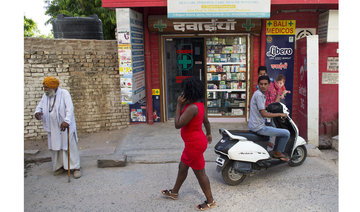MEERUT, INDIA: Not a buffalo in sight as businessman Haji Shadab paced the silent abattoir, his meat shipments indefinitely on hold as India reels from a crisis threatening its reputation as the world’s largest buffalo meat exporter.
A zealous campaign to protect cows — considered sacred by Hindus — by a new right-wing government in Uttar Pradesh state has sent India’s $4.8 billion buffalo meat industry into a tailspin as slaughterhouses have closed and exports stalled.
Hindu hard-liners have long accused abattoirs — largely run by Muslims — of covering up the slaughter of cows and passing off the meat as buffalo, which are not revered as holy.
In Uttar Pradesh, those radical Hindus have a new hero: Yogi Adityanath, a firebrand priest who took office in March promising tougher penalties for cow slaughter and a crackdown on illegal slaugtherhouses.
Just days after he was sworn in, three Muslim-run butcher shops in Hathras were torched — a bad omen for India’s largest meat-producing state, home to more than half its abattoirs.
Police then began shutting butcheries, some of which had been operating for decades, for alleged violations of local laws, grinding Uttar Pradesh’s entire buffalo meat industry to a halt.
Outraged butchers launched a statewide strike Monday, while for exporters like Shadab — who ships around 70 tons of buffalo meat a day to Asia and the Middle East — his supply of livestock dried up.
“We are not taking fresh orders from clients while the situation here is unclear,” Shadab told AFP at his Meerut slaughterhouse, which employed 1,500 staff before he sent them home until further notice.
“But in the long term, buyers will certainly move to other countries if we can’t deliver.”
The crippling buffalo shortage is being felt economy-wide in Uttar Pradesh, a state of 200 million where more than one in 10 are directly involved in meat and related businesses like leatherwork and transportation, industry figures show.
In Lucknow, restaurants which have been selling buffalo kebabs for more than a century have pulled the signature dish from the menu, unable to source the meat.
“You can see for yourself what impact this is having. We’ve hardly got any customers,” Yahaya Rizwan told AFP at his deserted eatery Mubeen’s.
Even the city zoo has resorted to feeding lions and tigers white meat to counter the buffalo shortage, said zoo director Anupam Gupta.
Cow slaughter is illegal in Uttar Pradesh and many other states, with some enforcing life sentences.
But it is Hindu vigilantes, emboldened by the government clamp down, that have businesses most on edge.
Farmers, wary of “cow protection” squads forcefully inspecting trucks for signs of the holy animal, were unwilling to make their usual deliveries, business owners told AFP.
“They are a little scared,” said DB Sabharwall from the Indian meat association.
Rumours of cow slaughter can spark murderous reprisals in the religiously divided state, where nearly one in five is Muslim.
Authorities insist the shutdowns are motivated by regulation, not religion, claiming only businesses without licenses will be targeted.
But in a butcher’s alley in Meerut, dozens of Muslim meat vendors proudly displayed their trading permits outside their shuttered shops.
“Everything was fine before Yogi came to power,” said butcher Riyaz Babu Qureshi.
“We’ve never faced this situation before. It’s terrible.”
Prime Minister Narendra Modi’s ruling party appointed Adityanath after winning Uttar Pradesh in a landslide, handing the reins of India’s most important state to an ideologue known for his inflammatory rhetoric against Muslims.
Modi has sought to keep his party’s Hindu nationalism at arm’s length since taking power in 2014, but the slaughterhouse crackdown has raised doubts about his proclaimed commitment to economic growth and job creation.
“This is totally anti-business. It will dent India’s image globally,” Shadab said.
Meat businessman Shahid Akhlaq, who sent 3,000 workers home when three of his factories were shut, expressed dismay that a witch-hunt over cows was taking precedence over their livelihoods.
“The government claims ‘together for all, development for all’, but we don’t see that happening on the ground,” Akhlaq told AFP, quoting Modi’s campaign slogan.
“When you target a particular community, it definitely creates fear.”



























